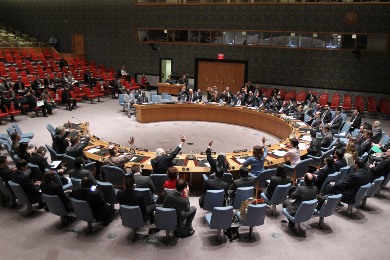Security Council narrowly imposes arms embargo on South Sudan
July 13, 2018 (WASHINGTON) – The Security Council on Friday narrowly endorsed a resolution imposing an arms embargo on South Sudan until 31 May 2019, a measure that rights groups and the U.S., the penholder on South Sudan called for since two years ago saying it would protect civilians.

The vote was identical to the vote of the resolution 2418 of 31 May 2018 which renewed South Sudan sanctions regime and the mandate of the Panel of Experts until 15 July.
It is has been noticed that the Côte d’Ivoire is the only African country that used to not observe the principle of African solidarity or the decisions of the African Union in several antecedents.
Endorsed under Chapter VII, the resolution provides all Member States must immediately take the necessary measures to prevent the direct or indirect supply, sale or transfer of weapons and ammunition, military vehicles and equipment, paramilitary equipment, and its spare parts to landlocked South Sudan.
The ban further includes “technical assistance, training, financial or other assistance, related to military activities or the provision, maintenance or use of any arms and related material, including the provision of armed mercenary personnel whether or not originating in their territories”.
It is clear that Kenyan and Ugandan governments would be under the focus of the UN monitoring mechanisms as Juba used to ship its military equipment and weapons through these two countries.
Praising the resolution, Amnesty International said the arms embargo is a step in the right direction towards minimizing harm to civilians in the war-torn nation.
“All states, especially South Sudan’s neighbours, must now strictly enforce the arms embargo and play their part in silencing the guns. The UN Security Council must also learn from past mistakes and implement robust mechanisms to monitor and enforce strict compliance with the embargo,” said Seif Magango, Amnesty International’s Deputy Director for East Africa, the Horn and the Great Lakes.
Last February following the imposition of weapons embargo by the US administration on South Sudan, The Ugandan President Yoweri Museveni pledged that his government would facilitate delivery of arms to Juba defying the weapons ban and other sanctions.
Also, a UN report in March, in a joint press conference with the then US Secretary of State Rex Tillerson, Kenyan Foreign Minister Monica Juma denied that its country is supplying weapons and ammunition to the warring parties South Sudan.
Friday’s resolution renewed the South Sudan Sanctions regime until 31 May 2019 and the Sanctions Committee’s Panel of Experts until 1 July 2019. Also, it imposed targeted sanctions on two additional individuals: Paul Malong Awan, the former Chief of Staff of South Sudan’s army turned rebel leader, and Malek Ruben Riak, former Deputy Chief of Staff of South Sudan’s army.
The two generals who are subjected to a travel ban and asset freeze are accused of fomenting violence and hampering efforts for peace in South Sudan.
Following the vote, U.S. Ambassador Nikki Haley pointed that the measure aims to stop the war and put pressures on the warring parties to end the clashes that displaced around four million and left millions in need of humanitarian assistance.
“If we’re going to help the people of South Sudan, we need the violence to stop. And to stop the violence, we need to stop the flow of weapons to armed groups, that they are using to fight each other and to terrorize the people,” Haley said.
For their part, Ambassadors of Ethiopia and Equatorial Guinea voiced concerns that the punitive measures could undermine the fragile, ongoing peace process in South Sudan.
The resolution condemned the failure of the warring parties to honour the different ceasefire agreements they signed including the 17 August 2015 Agreement on the Resolution of the Conflict in the Republic of South Sudan (ARCSS), the 21 December 2017 Agreement on Cessation of Hostilities, Protection of Civilians and Humanitarian Access (ACOH), and the 27 June 2018 Khartoum Declaration.
Accordingly, the resolution demands the South Sudan’s leaders to adhere to the ARCSS, ACOH, and 27 June 2018 Khartoum Declaration and allow, “full, safe and unhindered” humanitarian access to all those in need.
Human Rights Watch’s Senior Advocacy Coordinator, Joyce Bukuru, on Thursday called for the imposition of the arms embargo pointing to a new report, by the Office of the High Commissioner for Human Rights and the UN peacekeeping mission in South Sudan that documents murder, rape, and other human rights abuses by South Sudan’s soldiers and armed groups during an April-May military campaign in southern Unity region.
“Instead of being drawn in by the latest political manoeuvres from South Sudanese leaders, the Council should address the suffering of South Sudan’s civilians. They’re the ones who need an arms embargo now,” Bukuru emphasized.
(ST)
